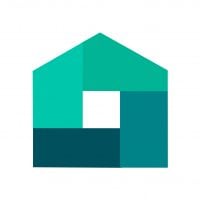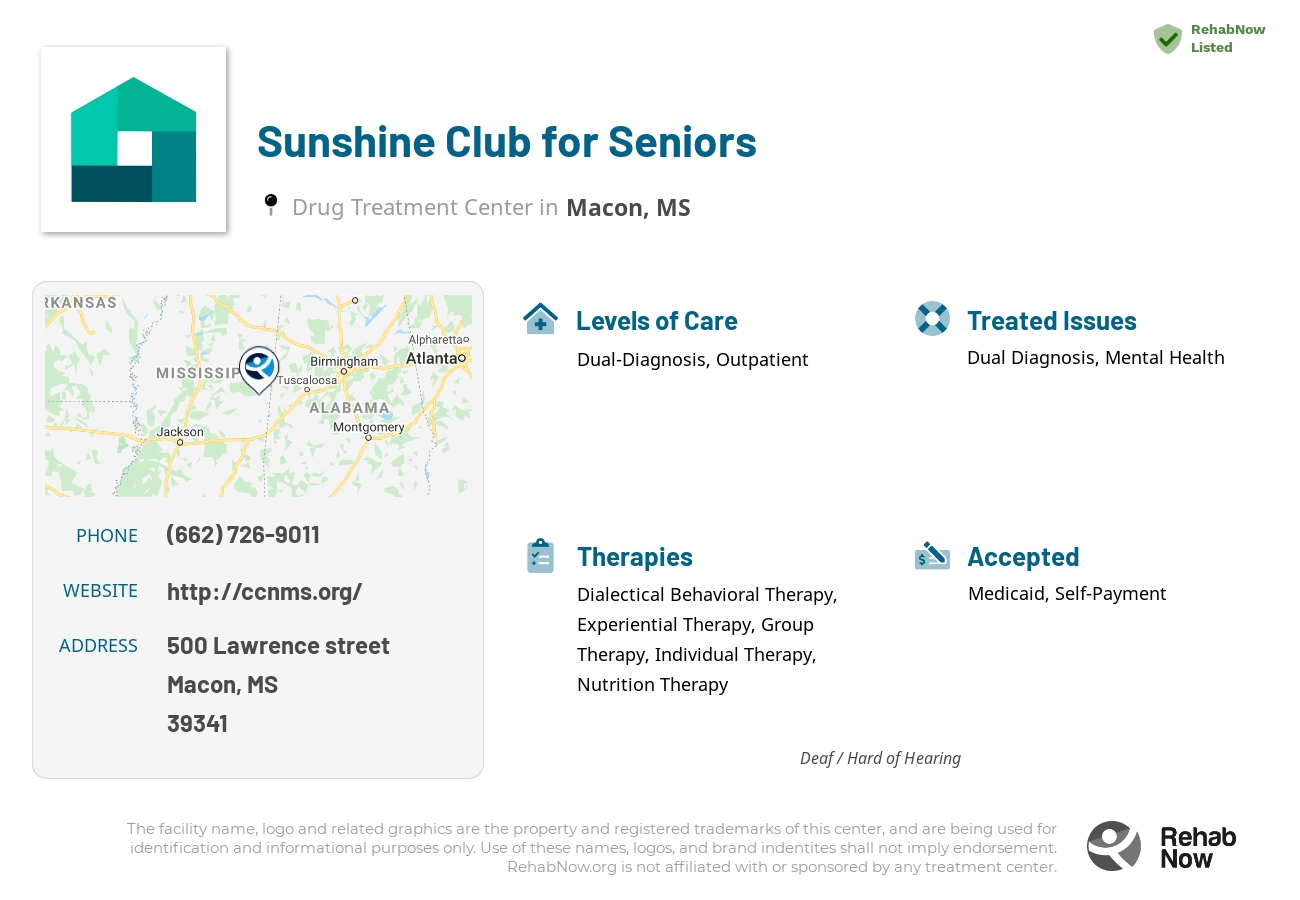Sunshine Club for Seniors
Drug Rehab Center in Macon, Mississippi
The Sunshine Club for Seniors in Macon, Mississippi offers high-quality services, including addiction and substance abuse treatment, to help elderly clients maintain independent and fulfilling lives with well-maintained living quarters, a fully-equipped fitness gym, professional medical staff, a variety of social and recreational activities, and comprehensive supportive and educational services.
About This Mississippi Facility
Sunshine Club for Seniors is an Addiction Treatment Facility located in Macon, Mississippi. Founded in 2003, this facility specializes in supporting individuals who suffer from dual diagnoses, mental health disorders, and drug addiction. Affiliated with Community Counseling Services, Sunshine Club for Seniors offers a range of comprehensive treatment options to help patients on their journey to recovery.
At Sunshine Club for Seniors, individuals struggling with addiction can find a variety of services suited to their needs. The facility provides dual-diagnosis treatment, addressing both addiction and any co-occurring mental health issues for a holistic approach to recovery. They pride themselves on offering outpatient care, allowing patients the flexibility to continue with daily life obligations while receiving the necessary support and therapy required to overcome addiction. Additionally, the facility provides aftercare support to ensure patients have continued guidance and assistance even after completing their formal treatment program. Overall, Sunshine Club for Seniors offers personalized and compassionate care to help seniors overcome substance abuse and achieve sustainable long-term recovery.
Genders
Ages
Modality
Additional
Conditions and Issues Treated
When addiction and psychiatric issues co-occur, the addict’s recovery is more successful when both conditions are treated. A dual diagnosis refers to a condition in which the patient is diagnosed with two health issues: addiction and bipolar disorder. The most common therapies are psychotherapy, behavioral therapy, spiritual counseling, 12-step programs, and medication management.
Levels of Care Offered at Sunshine Club for Seniors
This center offers a variety of custom treatment tailored to individual recovery. Currently available are Dual-Diagnosis, Outpatient, with additional therapies available as listed below.
An outpatient treatment program is set up to help with alcohol or drug addiction or a co-occurring disorder. The patient must attend the facility for their therapy and other programs but can return home each night.
The frequency of mandatory attendance decreases after much of Sunshine Club for Seniors‘s program is complete.
Outpatient treatment is a recovery approach that allows recovering addicts to live at home while getting rehab for addiction
An outpatient can include day treatments which include attending group sessions one hour per week. A person living in an outpatient environment may be allowed the opportunity to work full time if they choose to and continue studies without interruption from drugs/alcohol.
Outpatient treatment is an option for people who want to maintain their careers and families. Outpatients live at home but attend treatment such as individual counseling, group counseling, or twelve-step meetings during the day.
Therapies & Programs
At Sunshine Club for Seniors , to learn from past mistakes and improve one’s situation, the recovering person meets individually with a therapist. The counselor or therapist will address addiction causes, triggers, mental issues, dual diagnosis, and aftercare plans during this time. This is a very intense and challenging process. Some clients find it easier to open up to someone other than family or friends who understand their struggles with addiction.
In group therapy, recovering addicts meet with a therapist and other people in recovery. Some groups are closed, meaning only people who share the same addiction or problem can attend. Others are open to anyone who wants to stop using drugs or drinking alcohol. Group therapy sessions typically focus on one topic each week or month so that recovering addicts can discuss issues they face daily.
Dialectical Behavior Therapy (DBT) is a type of therapy created in the late 1980s and early 1990s. It was designed to help people with high rates of suicidal behavior.
The goal of DBT is to teach mindfulness, distress tolerance, emotion regulation, and interpersonal effectiveness to help people learn how to live a life that is no longer controlled by overwhelming emotions and urges.
DBT is beneficial in treating drug addiction because it helps patients understand and cope with their cravings for drugs or alcohol rather than turning to those substances as a way of coping.
Cognitive Behavioral Therapy (CBT) is based on the idea that how we feel, think and act all interact together. It helps people explore their thoughts for problems (or false beliefs) that influence their mood and actions. CBT is very goal-oriented, which means that the therapist and patient work together on a specific problem. In addition to helping a client focus on thoughts that can be changed, CBT also allows them to take an active role in their treatment. Our thoughts determine our feelings and behaviors; our feelings affect our thoughts, and our behaviors change our thoughts and feelings.
Nutrition therapy has been used to help drug addicts for decades. Many early reports on addiction treatment indicate that some patients recovered from the “satisfying power of food”. For years, this phenomenon has been utilized as a treatment modality in eating disorders for adults, adolescents, and children.
Specific nutrients have been identified that influence neurotransmitters associated with reward pathways of the brain. Studies have shown that carbohydrate loading with complex carbohydrates to elevate serotonin levels was effective in treating bulimia nervosa. This approach prompted researchers to explore the use of this type of nutritional intervention in other disorders.
The goal of nicotine replacement therapy is to provide a safe alternative for people trying to quit smoking. It does this by giving small doses of nicotine that help manage cravings while breaking habits associated with cigarettes.
Nicotine Replacement Therapy (NRTC) uses products like skin patches and gum that deliver low-dose nicotine, which prevents cravings in those quitting. This makes it easier for them to make a gradual transition from smoker to non-smoker.
Patient Experience
Experiential Therapy at Sunshine Club for Seniors
Experiential Therapy is a different way of thinking about addiction treatment. It uses physical activities to help work through troubling emotions, memories, and trauma that are sources of psychological issues like addiction.
Experiential Therapy can be an effective option for those who have struggled with past traumas or challenges associated with life decisions such as drug use. The non-traditional approach helps people deal more effectively with these struggles. It also allows them to gain new perspectives on their behavior patterns by recreating experiences in healthy ways rather than continuing old habits that may no longer serve them.
Payment Options Accepted
For specific insurance or payment methods please contact us.
Community Counseling Services Associated Centers
Discover treatment facilities under the same provider.
- Community Counseling Services - Ackerman in Ackerman, MS
- Community Counseling Services - Columbus in Columbus, MS
- Community Counseling Services - Ocean Springs in Ocean Springs, MS
- Community Counseling Services - West Point in West Point, MS
- Community Counseling Services - Eupora in Eupora, MS
Learn More About Community Counseling Services Centers
Additional Details
Specifics, location, and helpful extra information.
Macon, Mississippi 39341 Phone Number(662) 726-9011 Meta DetailsUpdated November 25, 2023
Staff Verified
Patient Reviews
There are no reviews yet. Be the first one to write one.
Macon, Mississippi Addiction Information
Mississippi has one of the highest rates of drug and alcohol abuse-related deaths. Approximately 350,000 residents use illicit drugs every year while another 108,000 abuse alcohol. In one year, doctors in Mississippi prescribed 76.8 opioid prescriptions for every 100 persons. This compares to the national rate of 51.4 prescriptions.
Treatment in Nearby Cities
- Carthage, MS (62.2 mi.)
- Decatur, MS (56.0 mi.)
- McComb, MS (169.9 mi.)
- Richton, MS (123.5 mi.)
- Magnolia, MS (175.4 mi.)
Centers near Sunshine Club for Seniors
The facility name, logo and brand are the property and registered trademarks of Sunshine Club for Seniors, and are being used for identification and informational purposes only. Use of these names, logos and brands shall not imply endorsement. RehabNow.org is not affiliated with or sponsored by Sunshine Club for Seniors.



